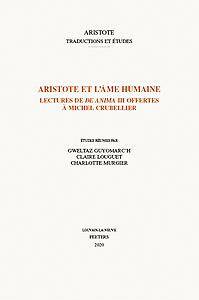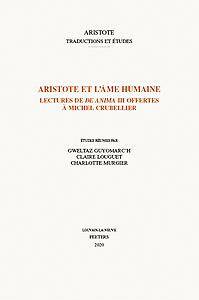
- Afhalen na 1 uur in een winkel met voorraad
- Gratis thuislevering in België vanaf € 30
- Ruim aanbod met 7 miljoen producten
- Afhalen na 1 uur in een winkel met voorraad
- Gratis thuislevering in België vanaf € 30
- Ruim aanbod met 7 miljoen producten
Zoeken
€ 80,56
+ 80 punten
Omschrijving
English summary: This volume offers a reading of Book III of De Anima, followed by thirteen chapters by leading specialists in Aristotelian philosophy. In this difficult book, which has not ceased to nourish the interpretations of commentators since antiquity, Aristotelian psychology, starting with the faculties that the human soul shares with the rest of the animals, rises to the cognitive functions by which man is distinguished from them. The thirteen studies in the form of a commentary on Book III of De Anima invite us to enter into this Aristotelian exploration of the human soul. French description: Le volume Aristote et l'yme humaine. Lectures de De Anima III offertes a Michel Crubellier, propose une lecture suivie, par de grands specialistes de philosophie aristotelicienne, des treize chapitres qui composent le livre III du De Anima. Dans ce livre difficile, qui n'a cesse de nourrir les interpretations des commentateurs depuis l'Antiquite, la psychologie aristotelicienne, partant des facultes que l'yme humaine partage avec le reste des animaux, s'eleve jusqu'aux fonctions cognitives par lesquelles l'homme, cette fois, s'en distingue. Les treize etudes de ce volume, en forme de commentaire du livre III du De Anima, nous invitent a entrer dans cette exploration aristotelicienne de l'yme humaine.
Specificaties
Betrokkenen
- Auteur(s):
- Uitgeverij:
Inhoud
- Aantal bladzijden:
- 374
- Taal:
- Frans
- Reeks:
Eigenschappen
- Productcode (EAN):
- 9789042940451
- Verschijningsdatum:
- 1/09/2020
- Uitvoering:
- Paperback
- Formaat:
- Trade paperback (VS)
- Afmetingen:
- 160 mm x 240 mm
- Gewicht:
- 612 g

Alleen bij Standaard Boekhandel
+ 80 punten op je klantenkaart van Standaard Boekhandel
Beoordelingen
We publiceren alleen reviews die voldoen aan de voorwaarden voor reviews. Bekijk onze voorwaarden voor reviews.








